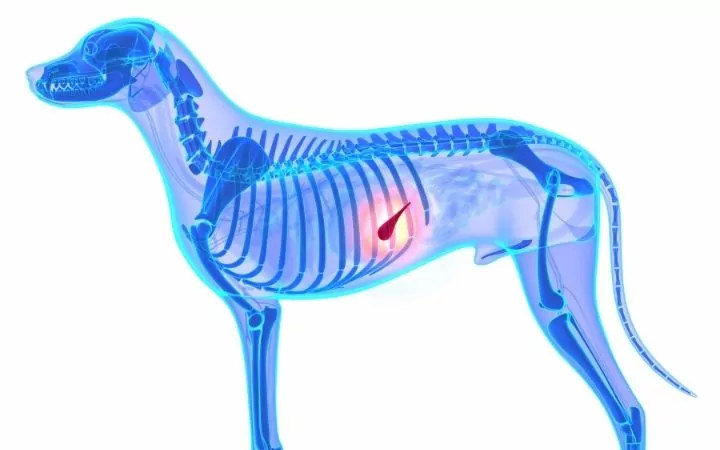Categorization of EPI in Dogs
We’ve all heard of the pancreas but we may not all know what it does. The pancreas is actually an incredibly important organ that sits in the upper part of the abdomen near the intestines and stomach. The pancreas has many roles including producing digestive enzymes to help the body digest food by producing digestive enzymes.
When the pancreas can no longer produce adequate digestive enzymes we call this Exocrine Pancreatic Insufficiency (EPI). Today we are going to focus on the cause, signs, and treatment of EPI in dogs.

Normal Exocrine Pancreatic Function
The pancreas is an organ that has two parts, the endocrine and the exocrine parts. The endocrine system produces hormones such as insulin and glucagon responsible for blood sugars being maintained and the exocrine system.
The exocrine pancreas produces digestive enzymes. In a normal functioning pancreas, digestive enzymes are released when food is ingested, they flow into the intestines through ducts into small intestines and help break down proteins, fats, and carbohydrates to aid in the digestion of food. Without digestive enzymes, the body is unable to retrieve the nutrients from the food it needs to function.
Etiology and Pathogenesis
In some dogs the exocrine part of the pancreas becomes irreversibly damaged, it can be damaged in different ways which are covered in more detail below.
When the exocrine pancreas is almost totally destroyed the body is unable to digest food, this leads to proteins, carbohydrates, and fats that would normally be digested continuing to pass through the intestines and out in the feces causing voluminous, pale-colored diarrhea.
The body is unable to get nutrients from the food that can’t be broken down causing malnutrition and weight loss. Also, the nutrients that aren’t digested can be fed on by bacteria which can cause bacterial overgrowth in the intestines. If left untreated EPI can lead to severe malnutrition which could be life-threatening.

Signs of EPI will only develop when 90% of the secretory capacity of the exocrine pancreas becomes damaged due to the body having a lot of redundancy (i.e. more than enough pancreas to produce adequate digestive enzymes when the pancreas is functioning normally). This means that an affected dog’s pancreas would have been getting destroyed for a long time before we see clinical signs associated with EPI.
Common Signs Associated with EPI
Signs of EPI are associated with the pathogenesis described above, namely the malnutrition and undigested food passing through the intestines.
Some commonly seen signs of EPI include:
- Weight loss due to nutrients not being absorbed.
- Increased appetite as the body tries to compensate for nutrients not being absorbed.
- Dull coat due to malnutrition.
- Greasy coat around perineal region and base of the tail and due to greasy feces.
- Flatulence from food not being digested.
- Rumbling or gurgling noise coming from the intestines (borborygmus).
- An increased volume of pale, smelly, and greasy feces.
- Occasionally you may see vomiting and increased drinking also.
Causes of EPI in Dogs
EPI occurs when the exocrine pancreas becomes damaged, this is irreversible.
The damage can be broken into three main causes. Firstly, the most common cause of EPI is when the acinar cells (which produce digestive enzymes) are reduced in size. This is referred to as atrophy.
This occurs most commonly in German Shepherd’s, in fact, German Shepherds account for two-thirds of cases of EPI. The exact reason why acinar atrophy occurs is unknown but it is clear it is inherited in some form. Acinar atrophy most commonly affects dogs between six months and six years. Other breeds affected include Rough Collies and Eurasiers.

Secondly, repeated bouts of pancreatitis, which is inflammation of the pancreas, can lead to irreversible damage of the exocrine system and therefore EPI. This can also cause diabetes when the endocrine system is also repeatedly damaged.
And lastly, the pancreas can become cancerous which can block the outflow of digestive enzymes leading to Exocrine Pancreatic Insufficiency.
Diagnostic Testing
For a confusing disease, the testing is actually quite simple. If your dog is showing signs of EPI as mentioned above, your veterinarian might recommend a blood test. This blood test checks for an inactive substance called trypsinogen. In a normally functioning body trypsinogen will be in high levels as this converts to trypsin, a digestive enzyme.
In a dog with EPI, trypsinogen will be low. Your dog will likely need to be fasted for 12 hours for this blood test, it may need to be repeated if the reading comes back as inconclusive.
Along with testing for trypsinogen, your vet will also want to check for a deficiency in Vitamin B12 (cobalamin) as this is very common in dogs with EPI and may need to be supplemented. Cobalamin levels can also be checked through a blood test. This blood test may need to be repeated to see if the supplement is working.
Subclinical EPI
As mentioned above 90% of the secretory capacity of the exocrine pancreas must be lost before we see clinical signs of EPI. In dogs with borderline low levels of trypsinogen but no signs of the disease, they would be classed as subclinical. Some dogs with low levels of trypsinogen may never show signs of EPI.
At this stage, subclinical dogs do not appear to benefit from treatment and instead should be monitored for signs of EPI and treatment only instigated when needed.

Available Treatment Options
EPI is not able to be treated as it involves irreversible damage to the pancreas. A dog diagnosed with EPI will require lifelong management. With appropriate management, dogs can live normal lives and have a normal life expectancy.
Once EPI is diagnosed it can be easily managed with the addition of digestive enzymes to meals. Digestive enzymes can be bought commercially in tablets or powders which can be sprinkled on the food before feeding to your dog, your veterinarian can advise on the best options for your pet.
Pancreas from animals killed for consumption can also be used and can be kept in the freezer for months without affecting the enzymes.
As well as adding digestive enzymes to your pet’s food, vitamin B12 may also need to be supplemented, this may need to be lifelong. This can either be orally or administered via injection at your veterinarian.
Follow up blood tests checking trypsinogen levels are rarely required once a diagnosis is made as these are not expected to change. B12 levels may need to be monitored depending on your pet’s levels.

Regular visits are recommended in newly diagnosed dogs with EPI to ensure weight gain and signs of malnutrition go away. Once your dog is stable twice-yearly visits are usually recommended.
Diet changes may also be a good idea to help with digestion. A diet that is highly digestible and low in fiber is most commonly recommended. If you need help deciding what your dog with EPI needs to eat, contact your veterinarian.
Key Points
- EPI is caused by damage to the exocrine part of the pancreas.
- When the pancreas can no longer produce adequate levels of digestive enzymes signs of EPI develop.
- EPI is most commonly seen in German Shepherds.
- Typical signs of EPI include weight loss, diarrhea, increased appetite, and dull greasy coat.
- EPI can be diagnosed with a blood test.
- There is no cure for a dog with EPI, it can only be managed.
- The management involves digestive enzymes and vitamin B12 supplementation.
- Digestive enzymes can be sprinkled on food.
- Vitamin B12 supplementation can be required for life.
- With appropriate management, dogs can live normal lives
